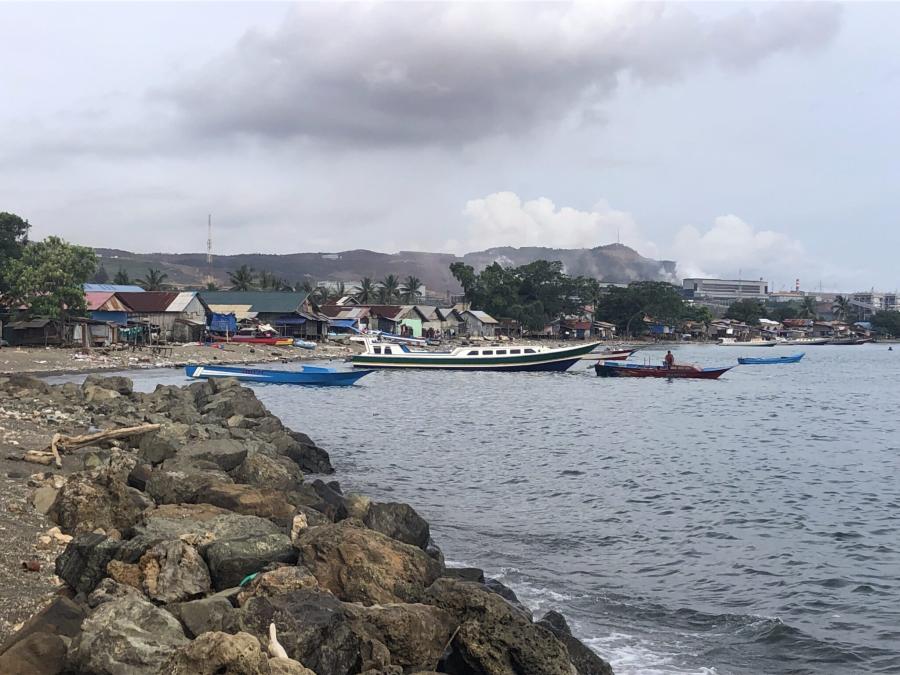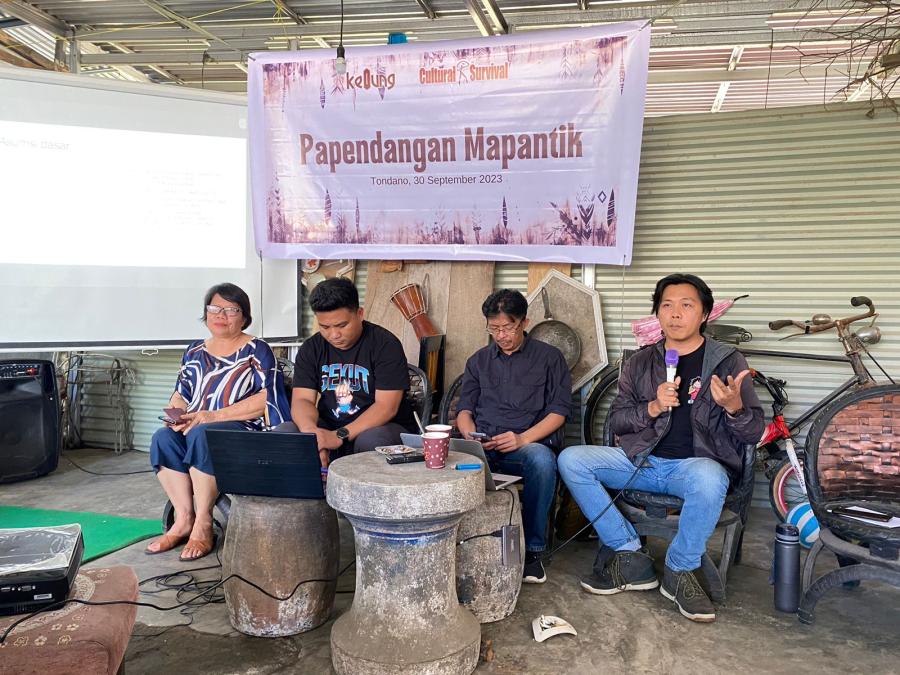The Badui call themselves Urang Kanekes. Urang means people in Sundanese, Kanekes is the name of their sacred territory, located in the Kendeng Mountain in south Banten, Java. The Badui rely on controlled interaction with the outside world to maintain the tradition of their group and to resist Islamisation.
The ability of the Badui to maintain their mysterious image by restricting communication with the outside world is their strength. They are averse to contact with foreigners and are secretive about the nature of their traditions. They are known in Java for having supernatural power, and they reinforce this reputation.
How long the Badui have lived in seclusion is still uncertain. Little is known of their cultural background, except that their religion reflects elements from both Hinduism and Buddhism. Their story of resistance to Islam is told in various local legends, which place the origin of the Badui in the 16th century, when Padjajaran, the last Sundanese kingdom, fell to Moslem conquerors. According to the legends, the Badui rebelled against Islam, lost, and fled to the mountains where they are today.
In 1931, during the Dutch rule, the Badui were saved from abandoning their present homeland by Dr. Mulhenfeld, the director of the West Indies Department of the Interior, who refused to accept a proposal to move them. Their slash and burn cultivation was seen as a threat to the forests of Banten, endangering the water supply for irrigation in the lowlands. However, Dr. Mulhenfeld, after visiting Kanekes, decided that a transfer would prove fatal to Badui culture. Today, in independent Indonesia, the Badui continue to protect their cultural heritage, despite government efforts to integrate them into the larger society through conversion to Islam.
The Badui refuse to be victims of change. They believe they have the mandate to maintain the harmony and balance of the universe, which depends on the preservation of their culture. To ensure protection, Badui society is divided into two groups. The inner Badui, or holy members of the hierarchy, occupy three sacred villages in the Taneh Larangan or "Forbidden Territory". They protect their community from exposure to external influences in order to ensure purity. Various buyut (tabu) impose seclusion upon them and prohibit the import of any form of technology (except knife blades). The holy members also discourage outsiders from gaining access to their community.
The Panamping, or outer Badui, live in some 28 villages and represent the commoners and the majority of the population of Kanekes. Their villages are located on the border between the Forbidden Territory and the Sundanese settlements. Due to the scarcity of land owned by the Badui they depend economically on the Moslem Sundanese. Although the seclusion has lessened, due to intermingling with the Sundanese community, the outer Badui continue to be hostile to non-Badui visitors. Geographically and politically their settlement is sheltered by the presence of the Moslem community, whose chiefs act as intermediaries between the outer Badui and non-Badui.
Formal relations with the government and foreigners in general, are administered by a Jaro dangkas, a Badui hereditary chief who acts as a mediator by controlling direct communication with the Pu'un, supreme chief of the entire Badui society.
Each of the three sacred villages is presided by a Pu'un whose superiority, according to the Badui cosmogony, is based on his sacred descent. The Pu'un are religious and political figures renowned for their supernatural power, inside and outside Kanekes. A Pu'un can read minds, predict the future and influence fortune. The supreme Pu'un represents the 13th generation of Batara Tungall, the upper deity of the Badui.
Traditionally, the Pu'un have been forbidden to divulge the secrets of the Badui people's rites and customs. Only a few anthropologists have succeeded in gathering second-hand data. What has been disclosed is contradictory, reflecting the effectiveness of their controlled communication. More than anything else, the Badui want to be left in peace and are suspicious when questioned by outsiders.
No outsider has ever been allowed to witness the rituals performed at Area Domas, the sacred place of worship restricted to the Pu'un and other high officials. Area Domas is where the soul of the Badui reunites with Batara Bungall after death. Every year the Pu'un brings back from Arca Domas predictions which shape the destiny of the community. The Badui claim that mysterious forces exist in Arca Domas, and that any intrusion or disturbance in the sacred place of worship would adversely affect prosperity in the world.
Although the supernatural power of the Pu'un is accepted as omnipresent, there have been instances when, unaware, he allowed himself to be seen by visitors.
While outsiders are forbidden to approach inner Badui land, the Pu'un sends a delegation to a non-Badui city, Serang, the capital of Banten, annually. Fruits from the sacred land are ritually offered to the local administrator to symbolize the bond between the contemporary Sundanese and the supernatural guardians of the Sundanese soil and tradition.
Many Sundanese still consider the Badui their guide for moral conduct and law. To the Javanese, the Badui are predominantly associated with magical power. The fascination of the Javanese with the Badui's mystical power strengthens the powerful image projected by the Pu'un. As a spiritual leader, a Pu'un will see Indonesian citizens who seek his guidance, but generally one must be recommended by an influential person from outside Kanekes. Visitors are then escorted to the lowest ranking village and are not allowed to stay after consultation.
Until the 1960s even the leaders of Indonesia valued consultation with the Badui. Under Sukarno, the former President of Indonesia, Badui were given government protection, even the President visited the Pu'un by helicopter on several occasions. He was given a Kris by the Badui when he came to power, perhaps to symbolize the link between the mythical founders of Java and the current generation of the Indonesian people.
Even today many government officials and politicians believe they owe their positions to the Pu'un's power. Yet in spite of the widespread respect for the Pu'un, the survival of Badui tradition is threatened. Recently, there has been government pressure to send Badui children to school. Schooling and Islamic teachings are a means of gradually integrating Badui society into the larger Islamic society of Indonesia.
A Javanese anthropologist wearing the slogan "to research, to teach, to serve" on his T-shirt, explained that people like the Badui should be forced to "progress." He added that it was nevertheless very difficult to enter Kanekes because they (the Badui) are "very strong." When relations with the government are at stake, the Badui turn from mysticism to shrewdness and pragmatism. The Badui do not resort to violence to solve their difficulties, instead they warn that any disruption within their society would lead to disturbance in the cosmos. How long can such a defense be effective?
The Badui strive to keep one step ahead of the government. An ethnomusicologist and scholar of the Badui reported that to alleviate government pressure, the Badui built a symbolic mosque on their territory. When a population census was being taken, the Badui already had their answers available. Although I was given the figure of 5,000 for the whole of Kenekes, the actual number of their population is kept secret.
Aware of the threats to their culture, ten years ago the Pu'un requested a Dutch scholar in Java to record their history. Much to this scholar's surprise, two Badui dressed in white - the traditional color of the inner Badui - arrived in his office. He had never been in contact with the Badui before, and to this day he wonders why they chose to trust him and how they found him.
Despite several cultural changes that other people in Java have experienced throughout the centuries, the Badui have maintained their ancient tradition. Now their future is their major concern. If the government is successful in establishing its educational system, Badui culture will be destroyed. Already, the outer Badui have frequent contact with the outside world. As a result some of them are confused about their identity.
The development project of the government is not committed to the welfare of Badui society, but rather is motivated by ideological reasons based on Islam and notions of centralized states. The Badui will not benefit from assimilation into Islam, nor will they gain materially. Java is well known as one of the world's poorest and most densely populated regions (80 million people eking out a living on an island the size of New York State). The present religious, economic and political system in Java cannot offer them a significantly better existence than the one they have established in Kanekes.
Article copyright Cultural Survival, Inc.



